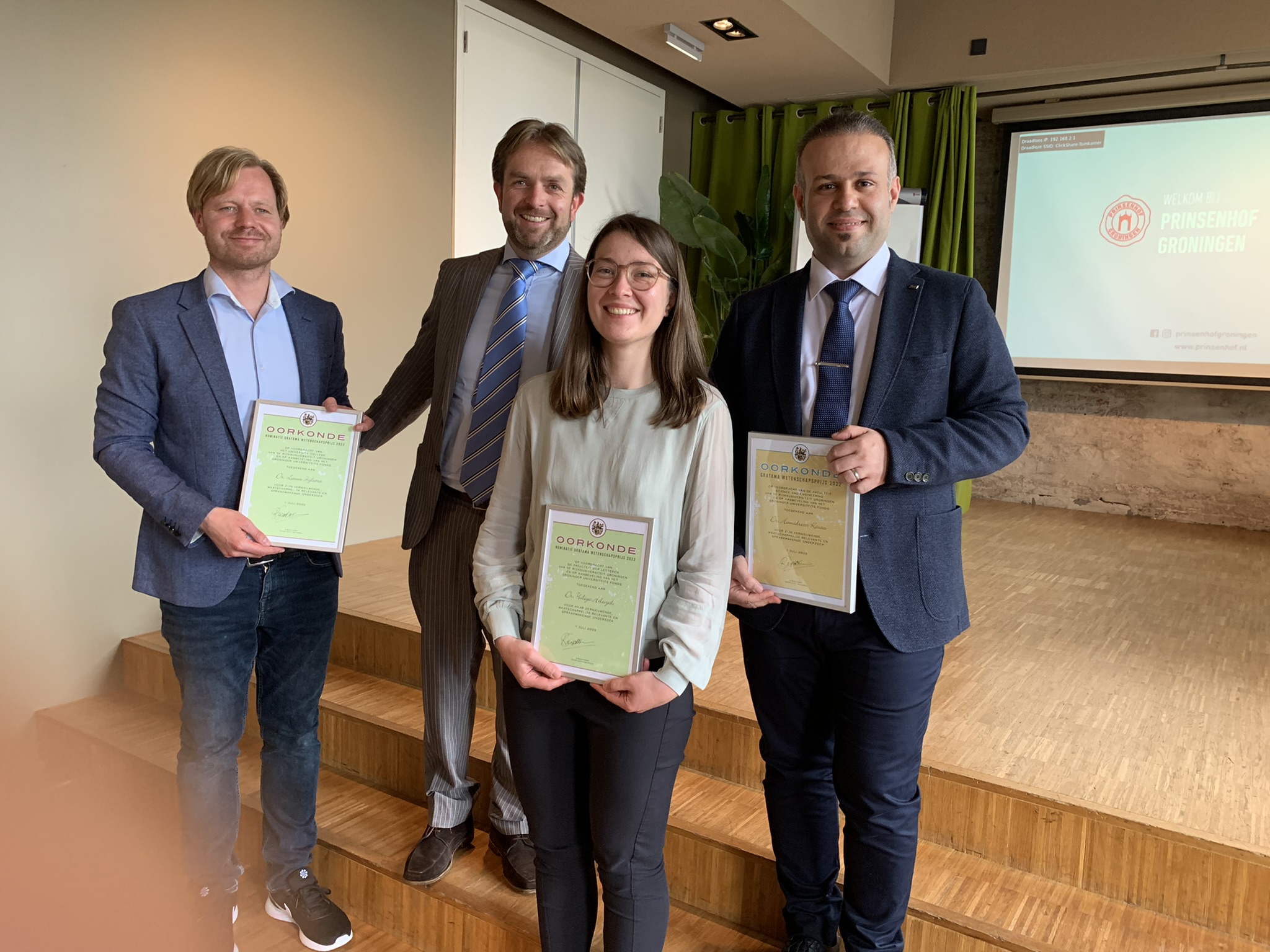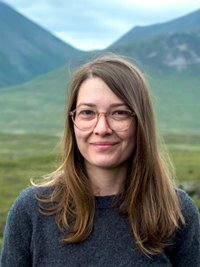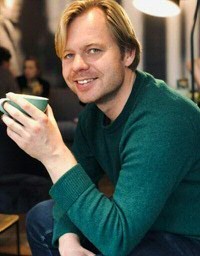Nominees
Vanuit de Rijksuniversiteit Groningen (dan wel de Universiteit Leiden) kan elke faculteit, in het jaar dat de Gratama Wetenschapsprijs aan een kandidaat van de desbetreffende universiteit kan worden toebedeeld, één kandidaat aan het beoordelende college voor de prijs voorstellen. De uiteindelijke winnaar ontvangt € 20.000, de twee andere genomineerden krijgen elk een bedrag van € 2.500, te besteden aan hun verdere wetenschappelijke ontplooiing.
2024
Dr Casper van der Kooi, Faculty of Science and Engineering
Casper van der Kooi has been assistant professor of Evolutionary Biophysics since 2023. His research is eminently interdisciplinary: he uses techniques from physics, i.e. optics, to understand the evolution of colours in flowers and insects. Over the past years, Casper gained insight into how various flower parts—pigments, internal structure, surface— contribute to the visual signal of flowers through an optic model and a detail study. Behavioural experiments with moths and bees revealed how insects react to visual effects. He published about this in top journals, such as Science, Current Biology, and Proceedings of the Royal Society B. Casper is a member of the Young Academy Groningen, editor of the scientific journal Annals of Botany and he issues advice to political parties about agriculture, nature, and biodiversity. The media frequently approach him for background information on current biodiversity questions, e.g. nitrogen, invasive exotic species. During these media performances, he emphasizes the importance of fundamental research. He uses concrete examples to explain that our living environment and biodiversity are under pressure, and what citizens can do about it. The University has made a short video about Van der Kooi’s research, which can be watched here.
Dr Susan Niessen, Faculty of Behavioural and Social Sciences
Susan Niessen carried out groundbreaking research in the academic field of selection psychology. Selecting people for degree programmes, jobs, and positions in the best possible way has far-reaching implications. For an honest and successful society, it is important to have the right people in the right place, where everyone is assessed in the same way, regardless of gender or background, for example. This is not an easy task and the selection psychology field has been concentrating on how to best go about it for quite some time, based on empirical research but within changing societal frameworks. In her PhD thesis, Susan investigated the best way to select candidates for higher education. With this research, she laid the empirical foundation for widely used selection practices in higher education. A good selection is not only important when selecting students and job applicants but also in the world of sports and in the army. After receiving her PhD in 2018, Susan further shaped her research line by focusing on the way in which decisions are made during selection procedures and how this can be improved. An important isue is how we can use transparent algorithms, provided they are well designed. For her research, Susan received nearly €1.5 million in government funding from regular grant providers but also, for example, from the Ministry of Defence. The societal impact of her work also shows in her work concerning selection for the Dutch National Police Force, Council for the Judiciary, Dutch Commando Corps, and the national Board of Tests and Examinations.
2022


Dr. Yuliya Hilevych, Faculty of Arts
Yuliya Hilevych (1988) is an assistant professor at the Faculty of Arts. She is conducting historical research into human reproduction, the social history of infertility, and of reproductive technology in Europe. Her research focuses on the human experience and search for meaning, as well as on social institutions and collective action, and shows how a humanities-based approach produces socially relevant results that can lead to innovative solutions to social problems. Dr Hilevych analyses social movements surrounding reproduction and the practice of abortion and relates them to large social issues such as population shrinkage, war, infertility, and childlessness.
In her PhD thesis, she showed that there were different abortion cultures and reproductive practices in Soviet Ukraine, which is extremely relevant for the current debates on the criminalization of abortion in some East European countries. The results of her research on shrinkage and war over the past eight years in eastern Ukraine are particularly relevant in the context of the current war in the country. She is currently writing a monograph on the social history of infertility. In addition, she is also one of the leaders of a large-scale project for Horizon Europe on gender relations and demographic crises in Eurasia.
Yuliya Hilevych is working together with renowned researchers affiliated with the universities of Cambridge, Oxford, and Lincoln. She is an in-demand speaker at universities, research institutes, and in national and international policy circles. Her contributions to the briefing papers of the United Nations in Washington, advice issued to the Ministry of Justice and Security, and media appearances attest to the broad reach of her research.

Dr. Lieuwe Zijlstra, University College Groningen
Lieuwe Zijlstra (1983) is affiliated with University College Groningen as assistant professor. He is an interdisciplinary researcher in the new field of experimental philosophy. Lieuwe Zijlstra’s academic career displays both his academically innovative and socially relevant qualities. A typical characteristic of his interdisciplinary research is that he conducts both empirical and philosophical research into topics that are directly linked to social issues, or on our daily life.
In his PhD thesis, he researched whether people are inclined to think that moral judgements are objectively correct or incorrect by combining philosophical research findings with conducting psychological experiments. During his PhD research in Groningen and Ghent, he conducted research at Yale University for a year and a half under the supervision of Joshua Knobe, leader in the experimental philosophy research field. This is a highly demanding field of research. It requires command of conceptual analysis and logic, as well as expertise in empirical research methodology and statistics. Zijlstra is a pioneer in the Netherlands. He is working on academic issues in moral psychology, perceptions of personal identity, happiness and search for meaning, as well as on the topic of moral progress.
In his interdisciplinary lectures at the University College Groningen, he asked students to research the relationship between memory and identity, the subjective experience of happiness in social groups, and the origins of moral judgements.
| Last modified: | 21 June 2024 10.35 a.m. |
